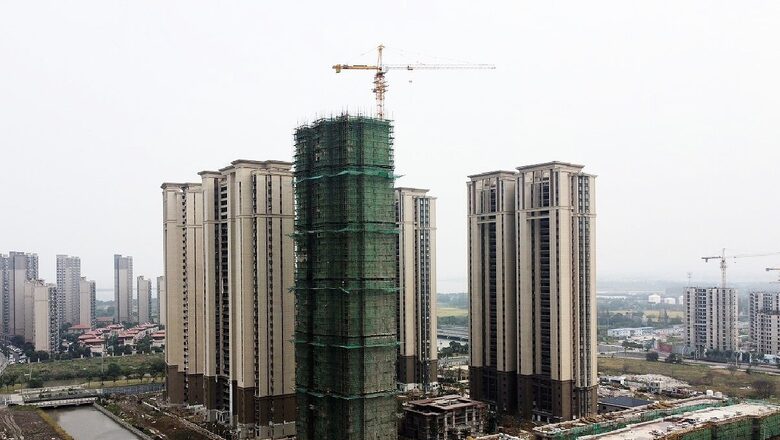
views
China has been facing a prolonged housing crisis. The country, once known for its booming real estate market, has around four million unsold apartments that no one wants to buy. The housing problem started in 2020 following China’s strict debt policy but still continues, with the Chinese government recently announcing its biggest $42-billion plan to buy unsold inventories. Here’s all you need to know:
Why Is China Facing A Housing Crisis?
China’s real estate market used to be a booming industry, driving almost a third of the country’s economic growth. But in 2020, the government abruptly stopped the flow of easy credit that fueled this growth. This sudden change triggered a wave of bankruptcies among developers and rattled the confidence of homebuyers across China.
Here are the factors that triggered the housing crisis in China:
Overconstruction: Fuelled by easy credit and the perception of property as a surefire investment, developers constructed a massive surplus of apartments, particularly in smaller cities. This oversupply has dampened demand for new homes.
Debt Burden: Chinese property developers went on a borrowing spree, accumulating significant debt. When the government implemented stricter regulations on borrowing in 2020 (‘Three Red Lines’ policy), many developers faced liquidity issues, stalling construction projects and further discouraging potential buyers.
Economic Slowdown: A broader slowdown in the Chinese economy has also impacted the housing market. People are more cautious about taking on large mortgages due to concerns about job security and future income.
What’s the ‘Three Red Lines’ Policy of 2020?
China introduced the ‘Three Red Lines’ in 2020 to rein in excessive borrowing by property developers. These rules limit debt based on assets, net debt based on equity, and ensure developers have enough cash on hand. It aimed to curb rapid growth, prevent a financial meltdown, and bring stability to the housing market.
How Deep Is the Crisis?
China is currently facing a staggering number of unsold apartments — around an estimated 4 million, according to The Straits Times. Apart from this, there are even more number of homes that developers already sold but have not finished building. According to The Straits Times, that figure is around 10 million apartments as per a conservative estimate.
The country is also facing a stagnation or decline in property prices, disrupting the early view of real estate as a continuously appreciating asset. According to official data, housing prices in China have slumped nearly 10 per cent since the start of 2024.
Apart from this, dozens of developers have defaulted on debts, raising concerns about the stability of the financial system. China’s giant property developer Evergrande got crushed by massive debt following China’s housing crackdown.
According to Wion, in the China Household Wealth Index Survey conducted by Southwestern University of Finance and Economics in Chengdu, Sichuan province, the index of spending expectations fell to 101.9 in the first quarter of this year, down from 103.0 in the fourth quarter of 2023. A reading below 100 indicates a contraction in spending plans.
Will It Have Any Impact On Its Economy or Other Countries?
Impact On China’s Economy: As China’s leaders fuelled real estate by providing cheap credit to developers, trillions of dollars are now owed to builders, painters, real estate agents, small companies and banks around the country.
Failure to repay could dampen economic growth in China. It might lead to bank loan defaults, job losses in construction and related industries, and a decrease in consumer spending.
Likely Impact On Global Economy: China’s housing market is a major driver of global demand for commodities like steel and cement. A slowdown could impact global prices of these materials. Additionally, if Chinese investors pull back from overseas markets due to domestic economic concerns, it could have a knock-on effect on other countries.
What Steps China Is Taking To Overcome The Real Estate Crisis?
To address the crisis, the People’s Bank of China this month unveiled $42 billion of funding to help local governments buy excess investory from developers.
The is also lowering down payment requirements for mortgages, removing the floor on interest rates for first and second homes, setting up a fund to finance purchases of unoccupied housing by state-owned enterprises and local governments for use as affordable housing.
However, the effectiveness of these measures remains to be seen. According to a Bloomberg report, pilot programmes to buy excess inventory by the government have been operating last year in eight cities of China, but they have had limited effect in stabilising property markets.




















Comments
0 comment